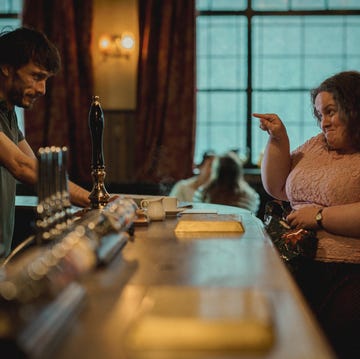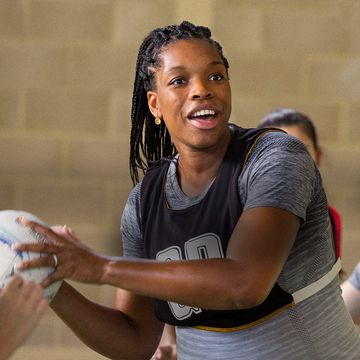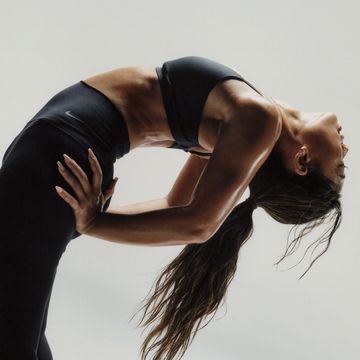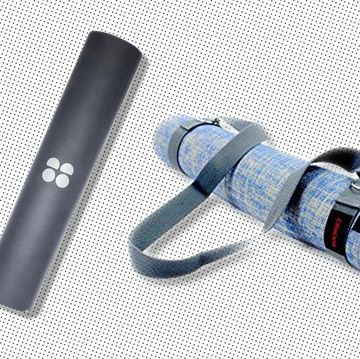When Running Free: A Runner's Journey Back to Nature, £16.99 [Yellow Jersey] landed on the ELLE Running Club's desk we stopped and took notice, leafing through the pages eagerly. Why were we so quick to take a look through? Well, as much as we love running, the organising of races, the multiple trainers we speak to, the early morning runs in the dark, well they had taken a little of the, dare we say it, fun and spontaneity out of our beloved past time.
Running isn't all about beating your best times, ensuring you have the best kit and checking your pace every five minutes. The most joyful running experiences the team have had have been escaping the city to run along cliff top beaches or lush countryside.
Here the book's author Richard Askwith reveals how to learn to love running again:
'One thing youre never short of as a runner is advice. If you want to improve your speed, stamina or resistance to injury, someone, somewhere will have some state-of-the-science tips for you, usually backed up with a high-priced product or two. But one tip tends to get forgotten: enjoy yourself.
Here are a few things they dont usually tell you in running shops.
(i) Unless youre part of the minuscule elite who run for medals, money, records and glory, the only sane reason for running is because it makes you feel good.
(ii) If running feels like a chore, sooner or later youll get bored and give it up. Maybe not today, maybe not tomorrow; but you will. So, the most crucial training tip of all is: dont let running become a chore.
(iii) Some of the joys of running dwindle with time. As a novice, you improve by leaps and bounds, as you shed the accumulated unfitness of the years. Later, the measurable returns diminish: each tiny improvement requires a mountain of effort. Before you know it, age and boredom kick in as well. If the only thing motivating you is shaving the seconds off your personal best (or the ounces off your weight), youll soon have little motivation left. As for the post-run benefits health, fitness, inner peace etc youll find that they fall off pretty quickly, too, once youve given up running (see previous paragraph).
(iv) If you dont want to get bored of running, focus outwards, not inwards. Never mind your time, your pulse rate, your calories burned, your stride length whats going on in the world around you? Look: its almost spring. Flowers are blooming; there are buds on the trees. If youre lucky enough to have access to the countryside, as I do, there are lambs in the fields, too, and thrilling new colours in the hedgerows. Even in urban parks, the grass feels warm and springy underfoot and theres a background sparkle of birdsong thats an like intravenous drip of optimism. There is, in short, a whole world for the runner to explore not necessarily on the same pavement you pound every day. Do yourself a favour: explore it.
(v) If you want to race, theres no rule to say that the only way to do so is in a mass-participation road-race with timing chips, goody-bags and a hefty entrance fee. Check out some of the alternatives trail-running, fell-running, obstacle racing, orienteering even cheese-rolling. Some might involve getting muddy, wet, or lost. So what? If you find a challenge that thrills you, youll barely notice the discomforts.
Thats what matters about running: the fact that its a joy and a privilege to be able to do it at all not the fact that youre a few hundredths of a second away from being the worlds 312,887th-best 10k runner.
Of course youll sometimes want to push yourself to your limits. Thats one of the things that make running so satisfying. But for 99.9 per cent of us a hundredth of a second one way or another doesnt make the blindest bit of difference whatever the running industry may tell us about the vital importance of kitting ourselves out like Olympians.
Running is now one of the worlds fastest growing industries: worth getting on for £16.5bn a year. Yet human beings have been running, for necessity and pleasure, for tens of thousands of years; spending money has only become part of the process in the past 50. A child doesnt need special training or equipment to discover the joy of running for fun, any more than a dog or a horse does. Why should you?
My own little tip for runners seeking fresh motivation for 2014 is simple. If youre lucky enough to have cash to spend on your running habit, buy a compass and a local Ordnance Survey map, not a pair of new trainers and keep what you save for a big night out.
My big tip is simpler still. Never mind the hi-tech kit. Never mind the stats and the science. Never mind marginal gains or peak performance. Just remind yourself that running is one of lifes great free gifts like natural beauty, music, poetry, sex and laughter. If it doesnt bring you joy, youre missing the point.
And if it does bring you joy, then, as the months fly by, youll find soon enough that, without your even having noticed, youve got faster and fitter as well.'












